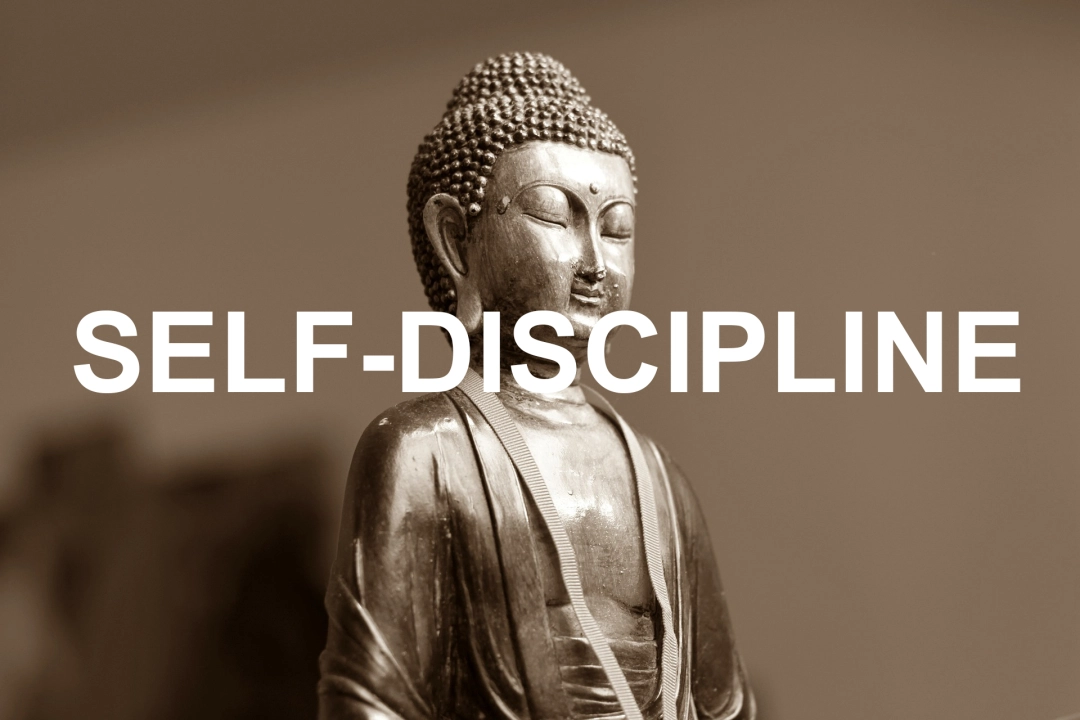Self-discipline is often defined as the ability to control oneself and one’s actions, particularly in the face of temptation or difficulty. It involves setting personal goals and priorities, creating routines and schedules to achieve those goals, and avoiding distractions that may impede progress.
Essentially, self-discipline is an essential aspect of self-control that enables individuals to maintain focus on important tasks or objectives despite external influences.
The Importance of Self-Discipline in Achieving Success
Self-discipline plays a fundamental role in achieving success in all areas of life. Whether it’s completing a project at work, pursuing a new hobby or skill, or maintaining good health habits, self-discipline is critical for achieving long-term goals.
Without this essential trait, individuals are more likely to procrastinate, make poor decisions and fail to achieve their desired outcomes.
Furthermore, the ability to maintain self-discipline can provide significant advantages in personal development and growth. By staying committed to achieving goals and cultivating positive habits over time, individuals can experience increased confidence and a sense of accomplishment that leads to further success in both their personal and professional lives.
The Benefits of Self-Discipline
The benefits of practicing self-discipline are numerous and far-reaching. In addition to helping individuals achieve success in their chosen fields or endeavors, it can also lead to better overall health outcomes by reducing stress levels and improving mental well-being.
Furthermore, those who practice self-discipline often enjoy better relationships with family members, friends or colleagues which lead to improved communications skills making them more effective communicators both personally and professionally.
Practicing self-discipline has far-reaching rewards which make it an essential trait for anyone seeking long-term success at any level – from personal growth and development through professional advancement.
Understanding Self-Discipline
What is Self-Discipline?
Self-discipline is the ability to control one’s behavior and actions in order to achieve a desired outcome. It is the practice of making conscious decisions that align with specific goals and aspirations, even if those decisions require overcoming short-term discomfort or temptation. Self-discipline is about staying committed to your choices, no matter what happens.
How to Develop Self-Discipline
Developing self-discipline requires effort and dedication. It involves a conscious decision to change your behavior, habits, and mindset. Here are some effective strategies for developing self-discipline:
Setting Goals and Priorities:
The first step in developing self-discipline is setting clear goals and priorities. This means identifying what you want to achieve in life, both short-term and long-term, and making a plan for how you will accomplish those objectives.
Creating a Schedule or Routine:
One of the most effective ways to develop self-discipline is by establishing a routine or schedule that supports your goals. A consistent routine can help you stay focused on what’s most important to you.
Avoiding Distractions and Temptations:
Another important aspect of self-discipline is learning how to avoid distractions and temptations that can derail progress towards your goals. This may mean avoiding certain people or situations that encourage bad habits or behaviors.
Practicing Mindfulness and Meditation:
Mindfulness meditation has been proven as an effective tool for improving focus, memory retention, emotional regulation as well as stress reduction which are all valuable components when developing self-discipline since this ability requires being able to remain calm during stressful situations while maintaining focus on one’s goal without being swayed by distractions.
By practicing these strategies consistently, one can develop a greater sense of self-discipline and the ability to make conscious choices that lead to success.
The Psychology of Self-Discipline
Self-discipline is both a mental and emotional skill that requires effort and practice. To understand the psychology behind self-discipline, it is crucial to acknowledge the role of willpower in achieving self-discipline.
Willpower refers to our ability to resist short-term temptations, distractions, or impulses to achieve long-term goals. However, willpower alone is not enough to maintain long-term discipline; it requires motivation and a strong mindset.

The Role of Willpower in Self-Discipline
Willpower is considered the foundation of self-discipline because it helps us override our impulses and make decisions that align with our long-term goals. However, willpower is like a muscle that can get exhausted when overused too much.
Research has shown that people who have strong willpower have learned how to manage their emotions effectively and set themselves up for success by planning ahead and breaking down big goals into smaller tasks.
The Importance of Motivation and Mindset
Motivation plays an essential role in maintaining self-discipline because it keeps us focused on our goals even when we face setbacks or obstacles. Intrinsic motivation comes from within oneself – a desire for personal growth, fulfillment, or satisfaction – while extrinsic motivation comes from external factors such as rewards or pressure from others.
A growth mindset can help individuals become more motivated by believing in their capability for change and improvement.
It involves embracing challenges as opportunities for learning, accepting mistakes as part of the process, and persisting in the face of adversity. Developing a positive mindset through habits such as affirmations or gratitude can also boost motivation levels.
Positive Thinking and Visualization Techniques
Positive thinking involves intentionally focusing on positive thoughts or outcomes rather than negative ones. This type of thinking has been linked with improved mental health outcomes such as reduced stress levels and increased resilience. Visualization techniques involve imagining oneself successfully achieving a goal or outcome.
These techniques can help improve motivation levels and increase confidence in one’s ability to achieve their goals. Research has shown that athletes who use visualization techniques experience increased performance levels.
Developing a Growth Mindset
A growth mindset involves believing that intelligence, talent, and abilities can be developed through hard work and dedication. This type of mindset empowers individuals to take on challenges, learn from mistakes, and persist through setbacks.
Developing a growth mindset involves letting go of limiting beliefs and embracing failures as learning opportunities.
Self-discipline requires both willpower and motivation, which can be developed through positive thinking, visualization techniques, and a growth mindset.
By understanding the psychology behind self-discipline, individuals can cultivate the mental and emotional skills needed to achieve their goals while maintaining long-term discipline.
The Benefits of Self-Discipline
Improving Health and Well-being
Self-discipline plays a crucial role in improving our overall health and well-being. By maintaining a healthy lifestyle through regular exercise, good nutrition, and proper sleep, we can reduce the risk of various physical illnesses such as heart disease, obesity, diabetes, and much more.
Practicing self-control can also help us avoid unhealthy habits such as smoking or excessive drinking which can negatively impact our health. Moreover, self-discipline is an effective tool for managing stress levels.
When we have control over our thoughts and actions, we can better manage our emotions and reduce the negative impact of stress on our bodies. Engaging in activities such as yoga or meditation can help us develop self-awareness and mindfulness which are powerful tools to help manage stress levels.
Achieving Success in Career or Business
Self-discipline is a key ingredient to achieving success in career or business. By setting clear goals and priorities for ourselves and developing a plan to achieve them, we increase our chances of reaching success. Developing self-control will allow us to avoid procrastination and distractions that hinder productivity.
Furthermore, by improving time management skills through effective planning techniques such as prioritizing tasks based on importance, breaking down large projects into smaller ones; this can make daunting tasks seem more manageable. This allows for better focus on important work while minimizing distractions from low priority activities like social media browsing.
Enhancing Personal Relationships
Practicing self-discipline helps build stronger relationships with family, friends, and colleagues. Being reliable is an important factor in building trust with others; by exhibiting discipline one’s word becomes dependable which strengthens these relationships over time.
Developing better communication skills go hand-in-hand with building stronger relationships through self-discipline.
Learning how to listen actively without interrupting others’ flow of thought or imposing our views while providing clear feedback helps avoid misunderstandings. Honing these skills can be instrumental in building lasting relationships, strengthening bonds, and fostering a more cohesive social environment.
Conclusion
Recap on the Importance of Self-Discipline
Self-discipline is the foundation for achieving success in all aspects of life. It is a skill that can be developed over time through consistent practice and focus.
Self-discipline involves setting goals and priorities, creating a schedule or routine to follow, avoiding distractions and temptations, and practicing mindfulness and meditation. Self-discipline is important because it helps individuals stay motivated in reaching their goals.
Without self-discipline, procrastination can set in which can lead to lower productivity levels and missed opportunities. Practicing self-discipline enables individuals to make better decisions, manage their time effectively, and achieve the results they desire.
The Rewards that Come with Practicing Self-Discipline
The rewards of practicing self-discipline are numerous. Individuals who practice self-discipline often experience improved health and well-being as they reduce their stress levels and improve their mental health.
They also tend to be more successful in their careers or businesses as they increase productivity levels while improving their time management skills.
In addition to career benefits, practicing self-discipline can also enhance personal relationships by building stronger connections with family members, friends, and colleagues. Better communication skills are developed which leads to deeper relationships that are more fulfilling.
Final Thoughts on How to Maintain a Disciplined Lifestyle
Maintaining a disciplined lifestyle requires consistency and patience. It’s important not to be too hard on yourself when you slip up but instead acknowledge the setback, learn from it quickly, forgive yourself then get back on track again as soon as possible.
A great way to maintain discipline is through accountability partners who share similar goals or habits with you where you regularly check-in on each other’s progress towards them . Furthermore taking breaks once in awhile from your routine will help prevent burnout or resentment towards your habits.
It’s important to stay positive and motivated throughout the process. Remember why you set out on this path in the first place and keep your eye on your end goals.
By consistently practicing self-discipline, individuals can create a more fulfilling and successful life. It is a lifelong journey that requires dedication, focus, and commitment but ultimately leads to great rewards.
20 quotes on self-discipline:
- “Discipline is the bridge between goals and accomplishment.” – Jim Rohn
- “Without self-discipline, success is impossible, period.” – Lou Holtz
- “Self-discipline begins with the mastery of your thoughts. If you don’t control what you think, you can’t control what you do.” – Napoleon Hill
- “The only discipline that lasts is self-discipline.” – Bum Phillips
- “Discipline is the refining fire by which talent becomes ability.” – Roy L. Smith
- “With self-discipline most anything is possible.” – Theodore Roosevelt
- “Discipline is the soul of an army. It makes small numbers formidable; procures success to the weak, and esteem to all.” – George Washington
- “Self-discipline is when your conscience tells you to do something and you don’t talk back.” – W. K. Hope
- “Discipline is remembering what you want.” – David Campbell
- “Self-discipline is a form of freedom. Freedom from laziness and lethargy, freedom from the expectations and demands of others, freedom from weakness and fear—and doubt.” – H.A. Dorfman
- “Self-discipline is the magic power that makes you virtually unstoppable.” – Dan Kennedy
- “Discipline is the foundation upon which all success is built. Lack of discipline inevitably leads to failure.” – Jim Rohn
- “Self-discipline is the key to personal greatness. It is the magic quality that opens all doors for you and makes everything else possible.” – Brian Tracy
- “Discipline is the suppression of base desires, and is usually understood to be synonymous with restraint and control.” – Mahatma Gandhi
- “Discipline is choosing between what you want now, and what you want most.” – Abraham Lincoln
- “Discipline is just choosing between what you want now and what you want most.” – Augusta F. Kantra
- “The first and best victory is to conquer self.” – Plato
- “He who cannot establish dominion over himself will have no dominion over others.” – Leonardo da Vinci
- “The only person you are destined to become is the person you decide to be.” – Ralph Waldo Emerson
- “It is not enough to have great qualities; We should also have the management of them.” – La Rochefoucauld
These quotes emphasize the importance of self-discipline in achieving success, controlling one’s thoughts and actions, and realizing one’s potential.
20 affirmations that can help enhance self-discipline:
- “Every day, in every way, I am becoming more disciplined and focused.”
- “I have the power to control my thoughts and my actions.”
- “I am constantly growing and developing my self-discipline.”
- “With each decision I make, I choose self-discipline.”
- “My willpower is strong and I choose to focus it on my goals.”
- “I am dedicated to achieving my goals and nothing can distract me.”
- “Every day I am more disciplined in my thoughts and actions.”
- “I enjoy the benefits of being disciplined and staying on task.”
- “I am disciplined in my eating, exercising, and sleeping habits.”
- “My ability to resist temptations increases with each passing day.”
- “I am resilient, persistent, and dedicated in my pursuit of my goals.”
- “I have the discipline to make healthy choices for myself.”
- “I am able to keep my commitments to myself and others.”
- “I have the self-discipline required to reach my goals.”
- “I am in control of my actions and I choose to lead a disciplined life.”
- “Every moment of every day, I am becoming more focused and disciplined.”
- “I am committed to my goals and will work towards them every day.”
- “I am focused, determined, and disciplined.”
- “I am the master of my own actions and decisions.”
- “My self-discipline helps me achieve my goals with ease.”
Remember, affirmations work best when you believe in them and repeat them regularly. You can choose a few from this list that resonate with you and make them a part of your daily routine.




























































